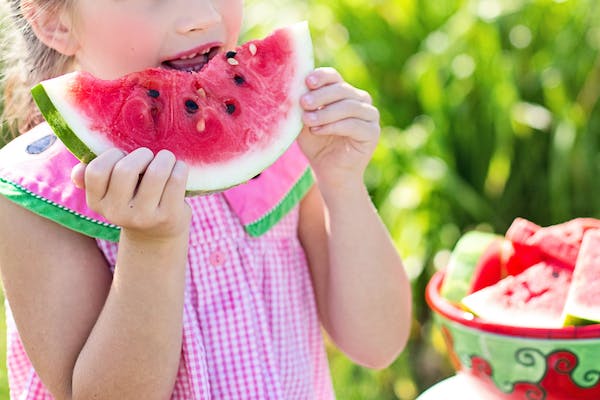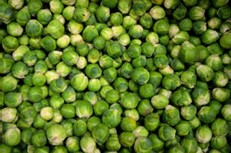The Science of Picky Eaters

The Science of Picky Eaters
–Kate Shadock, SEMG 2018
Every family has one, the child who turns their nose up at ice cream, cake, and cookies. Instead they want broccoli and brussel sprouts any way they can have them, raw, sautéed, roasted or steamed… Wait, is that the opposite of how your picky eater behaves? To this day I am the only member of a large extended family who voluntarily eats broccoli, cauliflower and Brussels sprouts without them swimming in cheese sauce. In fact swimming in cheese sauce is the one sure way to stop me from eating my favorite vegetables.
Many years ago (July 21, 2009) I watched a short Nova Science Now video explaining that children who will do almost anything to avoid broccoli and its cousins have a very real, genetic reason. They aren’t being a challenge – those foods simply taste horrible because of their genes. It was such a clear explanation I went hunting for the video to link to this article. Sadly the video is no longer available, though the transcript can still be accessed and is linked above. The following is an excerpt from that transcript. The dialogue not specifically identified to a certain expert is from Neil DeGrasse Tyson, the host of the episode.

photo: courtesy of Pexels
For some people there are foods that are good for you, and others find it delicious, yet the taste of them is so bitter and vile they will do almost anything to avoid eating it. Why? The answer may just lie in their genes. So why are some people picky and others aren’t?
Danielle R. Reed (Monell Chemical Sense Center) (DRR) Just like we differ in our ability to see and hear, people differ in their ability to taste.
Stuart Firestein (Columbia University)(SF) Flavor consists of several different sensory modalities. It’s not just the taste in your mouth…Also the way food smells in your nose, the way it looks on the plate and the way it feels in your mouth.
So why, can’t I taste certain foods if my nose is pinched shut? Why should my nose have anything to do with taste?
SF: Evolution has seen fit to devote as much of our sensory apparatus as possible to what we eat.
Our caveman ancestors had to use all their senses to find the nutrients they needed to survive a hostile environment. Just like us they probably loved sweets. There’s an evolutionary reason for that: Sugar in sweet foods provides a lot of energy.
Robert F. Margolskee (Monell Chemical Sense Center) (RFM) Sweet is very important, and most people strongly prefer sweets. This is a direct measure of the nutritive value of a food.
In other words we have a very different relationship with that bitter taste in many vegetables. Bitter is a warning.
RFM: Bitter is a protective sense. It’s a signal for something potentially poisonous. A plant puts out a toxic compound, so people won’t eat it.
So the bitter flavor in a plant prevents people from eating it. Our bitter taste buds honor and respect that fact in a plant? That still doesn’t explain why some of us love broccoli and others think it’s got a nasty bitter flavor.
RFM & SF: The answer is at the tip of your tongue. Those are tastebuds. These cells enable us to detect five basic flavors: sweet, salty, bitter, sour and umami, the Japanese word or the savory taste in meat and cheese. On the outside of each taste cell are finger-like projections, covered with hundreds of tiny taste receptors. When those receptors bind with the foods we eat, they open the chemical pathway into the cell that leads all the way to the brain; that’s what we call taste.
Why do some people hate the bitter taste found in green plants like broccoli and Brussel sprouts and others enjoy it?
RFM & SF: It’s because those little taste receptors on your tongue are actually proteins, made by your genes. They’re subunits of your DNA. That long chain of four chemicals best known by their initials, A, C, T and G and Biologists have discovered that out of the thousands of genes in your DNA there is one that determines if you like the taste of healthy greens or if you cannot stand them. That single gene was discovered by geneticist Dennis Drayna.
DRR: We are running an experiment with middle school students. We are having the students rub their cheeks with a sterile swab, giving researchers easy access to sample their DNA. Those four letters in the DNA – they are packed into 23 pairs of chromosomes. On one of those pairs is the gene they’re looking for. You get one chromosome from your mother and one from your father. This chromosome has a gene that’s the non-taster gene and this chromosome, from your dad might also be a non-taster gene.
Non-tasters don’t taste the bitterness in many vegetables because they have the letters G-T-A in that order in a certain spot on the gene. If you get G-T-A from your mom and dad, those taste receptors on your tongue cannot bind to the bitterness in broccoli. Instead, if you get the letters C-C-G from both your mom and dad, you can taste the bitterness in broccoli, and you are a “taster.”
DRR: That makes you very sensitive to bitter.
So next time you get frustrated with your picky eater, take a moment to relax and remember their genes may be influencing their food choices.
“It was such a pleasure to sink one’s hands into the warm earth, to feel at one’s fingertips the possibilities of the new season.”
~ Kate Morton, The Forgotten Garden

